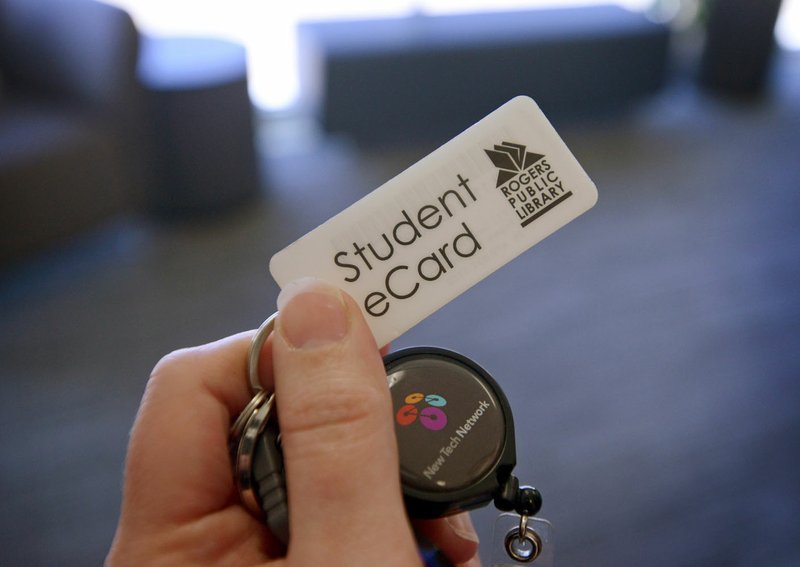A growing number of students in Northwest Arkansas are reading books online, downloading free music, learning foreign languages and receiving tutoring through Internet-only cards issued by city libraries.
Programs that connect Bentonville, Fayetteville and Rogers public libraries with schools have provided the Internet-only library cards to more than 36,400 students.
Library websites
• Bentonville Public Library: bentonvillelibrary.…
• Fayetteville Public Library: faylib.org
• Rogers Public Library: rogerspubliclibrary…
• Springdale Public Library: springdalelibrary.o…
Libraries online
What’s online through Northwest Arkansas libraries?
• Mango and other foreign-language programs
• TumbleBookLibrary for interactive books that appeal to young children
• Magazines through the Zinio service
• Music from Freegal
• Arkansas Library2Go for eBooks
• Tutor.com for live tutors from 3 p.m. to midnight
Note: Some services may not be available at all libraries.
Source: Library officials
Springdale Public Library has a similar program but does not track how many students receive the cards, said Laura Speer, coordinator of children's services.
The partnerships between libraries and schools fit with a push from the White House for greater student access to public libraries, said Fayetteville Library Director David Johnson.
The Fayetteville Internet-only card program is intended to bridge a gap for students who do not have access to digital books and other resources and those who can't come to the library, Johnson said.
"It extends the classroom beyond the classroom walls," Johnson said. "Ideally they become lovers of their libraries."
With Internet-only cards, students have the option of checking out electronic books, accessing programs for assistance with homework, foreign language programs and to Freegal, an online service that allows students each week to download up to five songs for free they can keep, Johnson said. Students also can read online magazines through Zinio.
Websites for the Bentonville, Rogers and Springdale libraries offer similar services. While some libraries have agreements that allow patrons from one city to receive a library card from another city, the Internet-only cards provide access only to the databases of the library that issued the card.
Students do not pay for any of the content available on the library's website, Johnson said. Students still have the option of going to the library to sign up for a borrowing card.
The program began about five years ago with an after-school program at Owl Creek School and expanded in 2013 to all students in Fayetteville School District, Johnson said. The program now reaches more than 10,000 students in the school district, as well as students at the Haas Hall Academy charter school and private schools. The program is open to students in home schools.
President Barack Obama last spring announced the ConnectED Library Challenge, a push for every student to have a library card, according to the Washington-based Institute of Museum and Library Services, a federal agency that is the primary source of federal grants to libraries and museums. The challenge is an extension of a broader goal for 99 percent of American students to have access to a high-speed Internet connection.
Officials from schools, governments and libraries in 50 communities met in Washington last month for a summit on the library card challenge. The summit shows the president and the federal institute recognize the value of partnerships between public schools and libraries, Johnson said.
The four Northwest Arkansas libraries have not joined the national library challenge, though libraries in different parts of the country have projects with similar goals as the challenge, said Giuliana Bullard, institute spokeswoman.
When teachers in Springdale schools express interest in signing up students for library cards, the library staff gives the teachers forms to complete, Speer said. The program is done class by class.
If parents complete the forms and are willing to pay for any lost items, students receive a card that provides access to online resources and allows them to borrow books, Speer said. Otherwise, students receive cards giving them access only to online library services, electronic books, audio books, videos and digital copies of well-known magazines, Speer said.
The Rogers Public Library this year distributed more than 18,000 cards to students and teachers in Rogers School District and at Arkansas Arts Academy, said Judy Casey, the public library director. The library plans to add private schools, she said.
The program in Rogers started a few years ago with a pilot with Rogers New Technology High School, Casey said.
Veronica Thiele, who teaches English at New Technology High School, sometimes has to remind her students about their access to information for research through the Rogers Public Library, she said. The library gives students the option of using electronic and audio versions of novels assigned in class.
Freshman Edgar Canales, 14, remembered reading Fahrenheit 451 as an electronic book last school year with his Rogers Public Library card, he said Thursday. He likes to listen to music available through the library website.
The Bentonville Public Library Tech Card program is in its second year, said Library Director Hadi Dudley. This year, the program has reached 8,400 students in 11 schools. The program will expand to more than 15,000 students in 19 schools next school year.
"It's a good illustration of how libraries are adaptable," Dudley said. "Instead of coming in and checking out a reference book that has literary criticism, they can access that from home."
NW News on 02/14/2016
